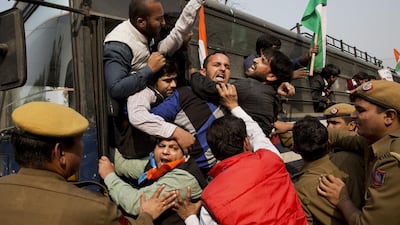There are growing calls for the abrogation of India’s British-era sedition law that critics say is being increasingly misused by Prime Minister Narendra Modi’s government to stifle dissent in the world’s largest democracy.
The law was introduced by British colonial powers in 1870 to crush rebellious voices but Indian governments continued to use it after the country gained independence in 1947.
The decades-long battle against the law as a threat to freedom of speech and democracy has gained fresh impetus after a spate of sedition cases this year against activists, journalists and ordinary citizens for criticising politicians and government policies.
In the most recent case, the filmmaker and activist Aisha Sultana was charged after criticising the Modi government’s decision to relax coronavirus pandemic protocols for entry to the remote Lakshadweep islands.
Ms Sultana claimed in a TV debate that the move, which was followed by a surge in Covid-19 cases, amounted to using a “bioweapon” against the islanders.
Lakshadweep police filed a sedition charge against her after members of Mr Modi’s Bharatiya Janata Party called her comments “anti-national”. Ms Sultana, who was summoned for questioning by police, on Friday obtained a court order granting her bail in case she is arrested.
Critics say her case is an example of the increasing use of the sedition law amid a rise in hyper-nationalism and a blurring of the lines between the state and government since the Hindu nationalist BJP won the general election in 2014.
Dushyant Dave, Supreme Court lawyer
A recent study found that 96 per cent of sedition cases filed between 2010 and 2020 over criticism of politicians and governments were registered after 2014. Of these, 149 related to criticism of Mr Modi or his government and another 144 to remarks against Yogi Adityanath, a Hindu monk who leads the BJP government in Uttar Pradesh state.
Overall, the number of sedition cases filed each year since 2014 was 28 per cent higher than the annual average during the four preceding years, according the report published by Article 14, a website that monitors India's legal system and citizens' rights.
"They are using this as a weapon to prevent people from speaking out," Lubhyathi Rangarajan, a lawyer who analysed data for the report, told The National.
The sedition law states that the charge applies to anyone who “attempts to bring into hatred or contempt, or excites or attempts to excite disaffection towards, the Government established by law in India”. The punishment ranges from a fine to prison terms of between three years and “imprisonment for life”.
People accused also become ineligible for government jobs and travel documents, and often face public suspicion and ostracism.
“Sedition attracts a certain kind of stigma as there is the label of ‘traitor’ and that is quite harmful,” Ms Rangarajan said, noting that there were “hardly any convictions” in such cases.
Of 96 people arrested for sedition in 2019, only two were convicted, India’s Home Ministry told Parliament in February. Twenty-nine were acquitted, while investigations and trials are continuing in the rest of the cases.
That month, the US think-tank Freedom House downgraded India’s democracy ranking, citing the rise in sedition cases over dissent as one of the factors.
Legal experts say Mr Modi’s government is using the law to stifle the voices of citizens who have political and ideological divergence with the ruling party.
"Sedition law is quite an antiquated law but it is more being applied in abuse than in use in present times, especially since 2014," Dushyant Dave, senior Supreme Court lawyer, told The National.
Activists have campaigned since independence for the repeal of the sedition law, which Britain abolished in 2009. But successive governments have defended it, saying the law is required to “tackle” terrorists, secessionists and insurgents.
India’s Supreme Court has issued judgments limiting the scope of the law to acts of violence, but those guidelines are often ignored. The top court reiterated its stand in a case last month.
“Criticising the government can’t be termed sedition. Everything cannot be seditious,” a bench headed by Justice Dhananjaya Chandrachud said while hearing a plea by two television channels charged with sedition for airing remarks by rebel politician against the Andhra Pradesh state government. “It is time we define what is sedition and what is not.”
A week earlier, the court quashed a sedition case against senior journalist Vinod Dua over his criticism of the Modi government’s handling of the migrant worker crisis during the pandemic last year.
“There is a great responsibility on the shoulders of the judiciary and particularly the Supreme Court,” Mr Dave said.
“The judiciary has failed citizens quite badly since 2014. I hope the judiciary becomes alive to the problems of citizens, to their fundamental rights and takes action against the authorities for illegal cases.”

